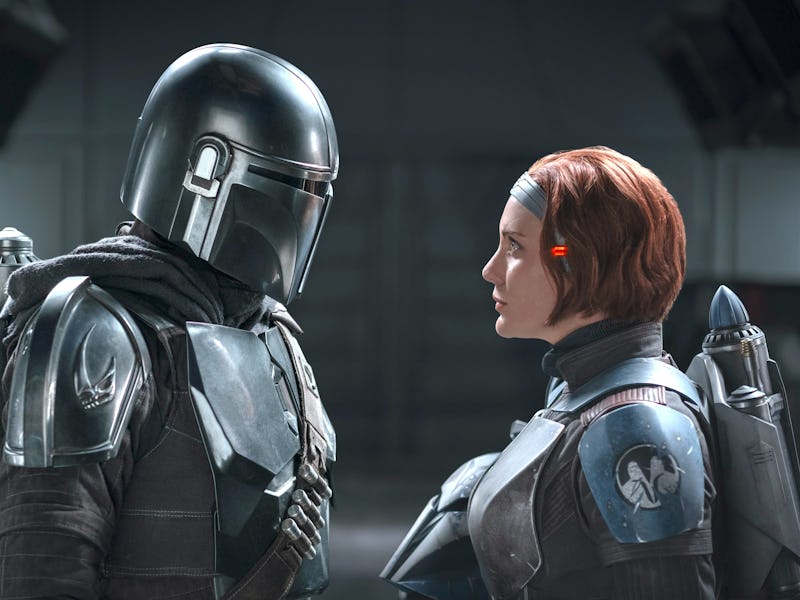The Mandalorian is about to finally address a disturbing Jedi truth
Ahsoka has something huge in common with Mando.

Star Wars isn't shy about its religious symbolism. In A New Hope, Admiral Motti takes a rare stand against Darth Vader and his obsession with the Sith, calling it a "sad devotion to that ancient religion." That famously didn't end well for Motti, but viewing creeds and societies in Star Wars through a religious lens adds some tragic subtext.
This subtext was made obvious in the most recent episode of The Mandalorian Season 2, and it draws an interesting parallel between Din Djarin and Ahsoka Tano that could change Star Wars on a fundamental level forever.
In Chapter 11 of The Mandalorian, Mando encounters the thing he's spent all of Season 2 looking for – other true Mandalorians. Bo-Katan Kryze, heiress to Mandalore, is on the watery moon Trask with a couple of her compatriots. Mando's shocked to see them take off their helmets, but Bo-Katan doesn't see an issue with it (just like in her many animated appearances). She then realizes he's "a Child of the Watch," which she explains are a "zealous cult that broke away from Mandalorian society" to restore the ancient Way.
In a moment, Mando's sparse backstory has changed forever. He wasn't rescued by a group of Mandalorians who showed him The Way, he was instead adopted into a cult and brainwashed into thinking their Way is the only Way. He's no longer an adopted member of a creed. Instead, he's someone who was secluded from other Mandalorian societies and made to think his way of life was completely normal.
The other huge reveal in Chapter 11 was the mention of Ahsoka Tano. Ahsoka, funnily enough, had a very similar upbringing to Din Djarin. Like most Jedi, she was separated from her family and started training from a very early age. (Even 9-year-old Anakin Skywalker was almost turned away by the Jedi for being too old). Like Mando, she was taught the ways of the Jedi were the only way to live and the only source of good in the galaxy.
Who's your favorite new TV character in 2020? Take the Inverse fan-favorites survey!
Ahsoka leaving the Jedi order in 'Clone Wars.'
Both Mando and Ahsoka exhibit classic signs of children who grew up in cults. Lorna Goldberg, a psychoanalyst and board member for the International Cultic Studies Association, writes that children in cults "have experienced little help with regulating the strong effects that are stimulated by the cultic environment, particularly anxiety, anger, and grief." In other words: they're deprived of the ability to process emotions. This sounds a lot like the Jedi teachings and Yoda's speech to young Anakin in The Phantom Menace. It also explains Mando's steely demeanor.
Comparing the Jedi to a cult may seem like a controversial stance, but the similarities run deep. In the recent HBO documentary The Vow, restrictive Master/Slave dynamics in the NXIVM cult are justified by a former member as being "like Jedi training." In the Star Wars fandom, there have been memes and essays comparing Luke's Jedi training in A New Hope to brainwashing and radicalization.
The biggest difference between Ahsoka and Mando is that Ahsoka escaped. At the time of The Mandalorian, Ahsoka is a former Jedi who's carved out her own path outside the Sith-Jedi dynamic. Mando, however, is still following the incredibly restrictive rules of the Children of the Watch. It's obvious he saw Cobb Vanth's treatment of Boba Fett's armor as heresy and his reaction to Bo-Katan is similar.
Bo-Katan Kryze without her Mandalorian helmet.
Mando thought the ways of the Children of Watch were universal. He never refers to himself as a Child of the Watch, but instead as a Mandalorian. Presumedly, whoever raised him convinced him every Mandalorian followed The Way as he knows it, and any Mandalorian who doesn't isn't a real Mandalorian.
This is a a textbook example of the No True Scotsman fallacy commonly seen in religious sects calling other similar sects "not true." The fallacy would be like arguing that "no Star Wars fan" likes Rise of Skywalker, being presented with the evidence of a fan who likes it, and then declaring they don't count because they're obviously not a "real Star Wars fan." It's a bad debate strategy, but it works well for indoctrinating children.
Hopefully, Mando meeting Ahsoka means he'll learn her story and realize that The Way he was taught isn't the only option for him. His newfound knowledge of other Mandalorians offers a new way of life he didn't believe existed, but it's up to him to decide how he lives his life.
The Mandalorian is a lot of things: a Star Wars story, a space Western, an exploration of the Empire's aftermath. However, it also has an opportunity to explore a story of someone rejecting their upbringing in search of their own way of life, and in doing so, it may be turning the fundamental building blocks of the Star Wars universe upside down.
The Mandalorian Season 2 is now streaming on Disney+.
This article was originally published on